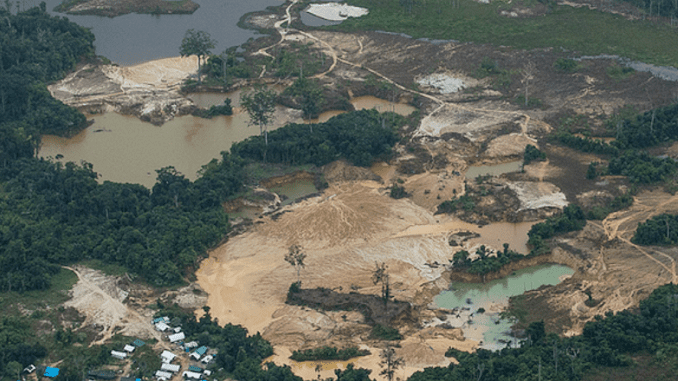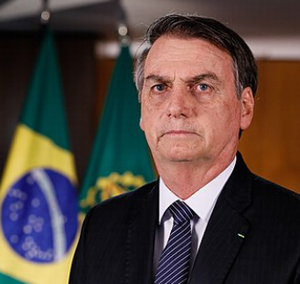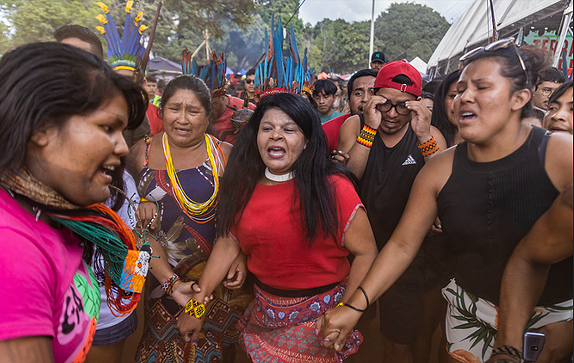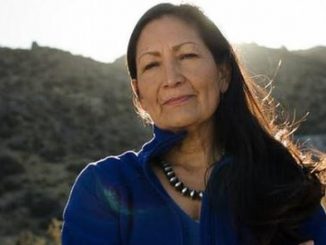
BRASILIA, Brazil, August 25, 2022 (ENS) – The Indigenous peoples of Brazil, subject to the rapid invasion of their lands by miners, loggers, hunters, fishermen, and land grabbers, are committing suicide and being murdered at record rates, a new report reveals.
In 2021, Brazil documented a record-breaking 305 cases of invasion, illegal exploitation, and damage within 226 Indigenous lands across 22 states. This is a 180 percent increase from 2018, the year before the administration of President Jair Bolsonaro began.
This data is part of the report Violence Against Indigenous Peoples of Brazil published on August 17 by The Missionary Council for Indigenous Peoples, CIMI, an organization of the Catholic Bishops Conference of Brazil.
CIMI President Archbishop Roque Paloschi of Porto Velho presented the report at the bishops’ conference headquarters in Brasilia. The year 2021 may have been “for many Indigenous peoples, the worst year of this century,” the CIMI report states.
In 2021, public sources of information registered 176 murders of Indigenous people, six less than in 2020, which remains the year with the highest number of reported murders since the report was first published in 2014.
The number of suicides last year among the Indigenous peoples of Brazil was 148, the highest ever recorded by CIMI.
The report blames the government, stating that the increase in invasions and attacks against Indigenous communities and leaders and the intensification of conflicts is due to “the institutional environment of offensive against the constitutional rights of native peoples.”
It is the sixth consecutive year that the survey has been published, and all six years the survey has recorded an increase in the number of cases of violence against Indigenous peoples over the previous year, a problem that has intensified during the current government of President Jair Bolsonaro.

Among the most affected Indigenous peoples are the Yanomami, Munduruku, Pataxó, Mura, Eru-Eu-Wau-Wau, Karipuna, Chiquitano, and Kadiwéu.
The new report registers cases of assassinations of Indigenous youth and children – often carried out with extreme cruelty. In 2021, the murders of Raíssa Cabreira Guarani Kaiowá, 11, and Daiane Griá Sales, 14, of the Kaingang people, were particularly brutal and called attention to this issue. Both were raped and killed.
The 281-page CIMI document includes reports collected by CIMI itself and details cases that made news – cases of femicide, defined as the killing of women and girls because of their gender; lacerations; poisoning; stabbing; hanging; and drowning.
“The cruelty is comparable to the most brutal period of colonization that Brazil went through, and it has greatly impacted us. There is a dehumanization of Indigenous peoples… and an environment marked by hate speeches disseminated by this government,” said Roberto Liegbott, coordinator of the report, in an interview with “Folha de S. Paulo,” a Brazilian newspaper.
According to the CIMI report, the escalation of invasions is related to a series of measures taken by the executive branch of Brazil’s government that has favored the exploitation and private appropriation of Indigenous lands.
Among those measures are Normative Ruling number 9, published by Brazil’s Indigenous foundation FUNAI in 2020, which allowed the certification of private properties on non-approved Indigenous lands.
In addition, the joint ruling with the Brazilian Ministry of the Environment’s administrative arm, IBAMA, allowed the economic exploitation of Indigenous lands by associations and organizations composed of Indigenous and non-Indigenous people.
Bolsonaro, has cut back environmental enforcement in the Amazon and defunded the government’s Indigenous protection agency FUNAI. The president says he encourages mining and commercial agriculture in the Amazon rainforest to create jobs and reduce poverty.
Bolsonaro has said Indigenous people have too much land, blocking the development of Brazil. He has pledged not to demarcate a single inch more of Indigenous reservation lands. Conservationists argue that the Indigenous reservations protect the Brazilian Amazon rainforest from destruction.

The CIMI report indicates that President Bolsonaro and his allies in Congress have advanced bills that make the demarcation of Indigenous lands difficult by promoting the adoption of the Marco Temporal, or “time limit clause,” that allows mining in these territories under the guise that federally recognized Indigenous land is only that which was registered at the signing of Brazil’s constitution in 1988.
The report identified that of the 1,393 Indigenous lands in Brazil, 871, or 62 percent, are still pending regularization. Of these, 598 are areas claimed by Indigenous peoples that have not received any action from the government to initiate the demarcation process.
The report states that the quantitative increase of cases and lands affected by the illegal action of miners, loggers, hunters, fishermen, and land grabbers, happened alongside the intensification of violence by these agents in Indigenous territories.
For example, in Yanomami Indigenous Land, where more than 20,000 miners are active and armed, Indigenous communities have faced attacks.
In the Brazilian state of Pará, illegal miners attacked a Munduruku village, setting fires to two houses, including the house of Maria Leusa Kaba, coordinator of the Wakoborum Women’s Association – whose office was also attacked and burned months before by the same attackers.
“We see huge machines, armed groups, shootings, and murders taking place in areas where wildcat mining of gold and other minerals like cassiterite is prominent. These invasions have increased systematically, especially in the Amazon region, but also in other regions where there is ore,” reports Lucia Helena Rangel, CIMI’s anthropological advisor.
“Every year we want to cry, we have a revolt in our chest, heart and head,” Rangel revealed. “Every year we would like Brazil, the people, society, farmers, politicians, the military to treat Indigenous peoples differently.”
Featured image: Illegal mining on the Uraricoera River in Yanomami territory, Roraima state in northern Brazil. (Photo by Bruno Kelly / HAY courtesy Amazon Watch)
© 2022, Environment News Service. All rights reserved. Content may be quoted only with proper attribution and a direct link to the original article. Full reproduction is prohibited.



